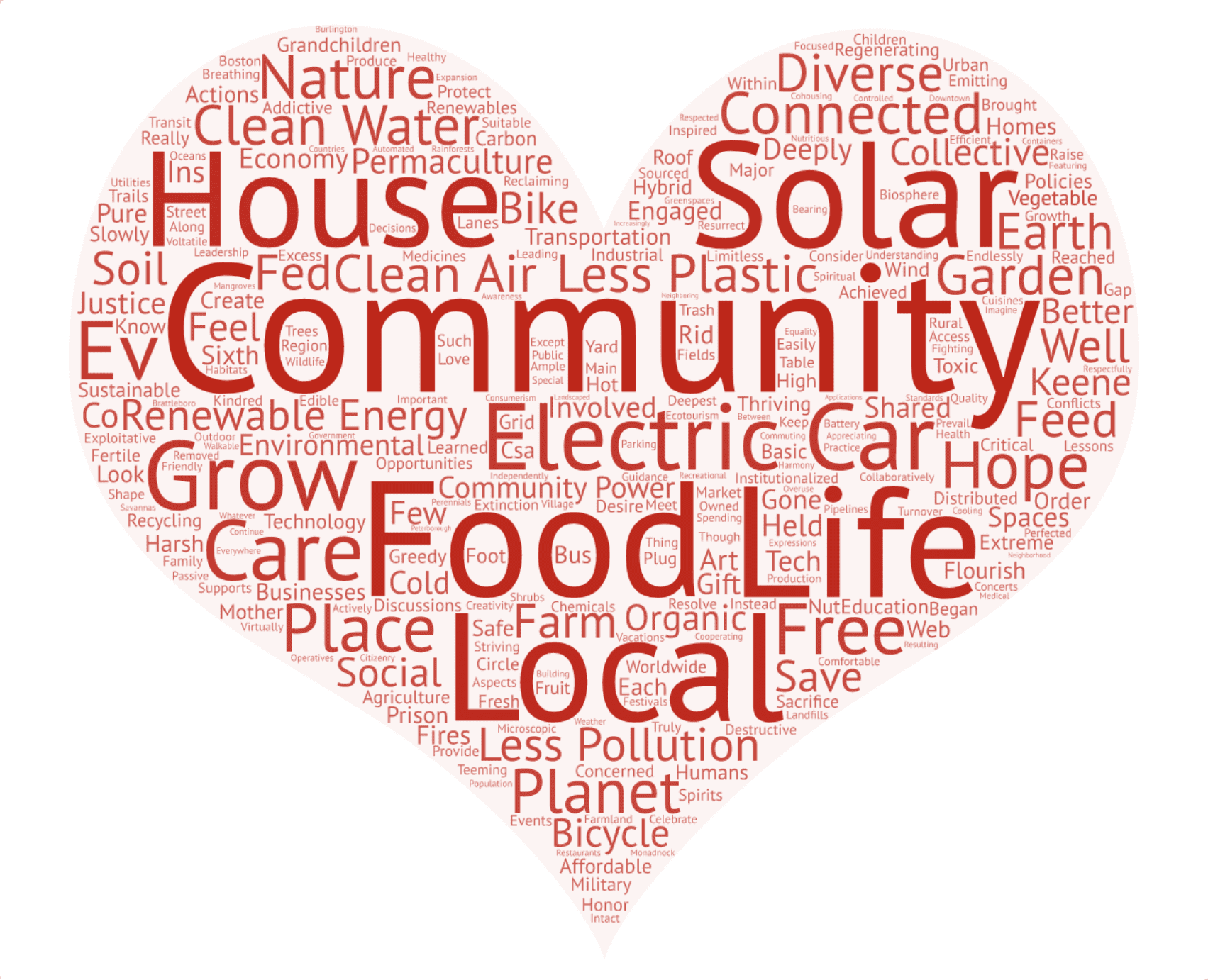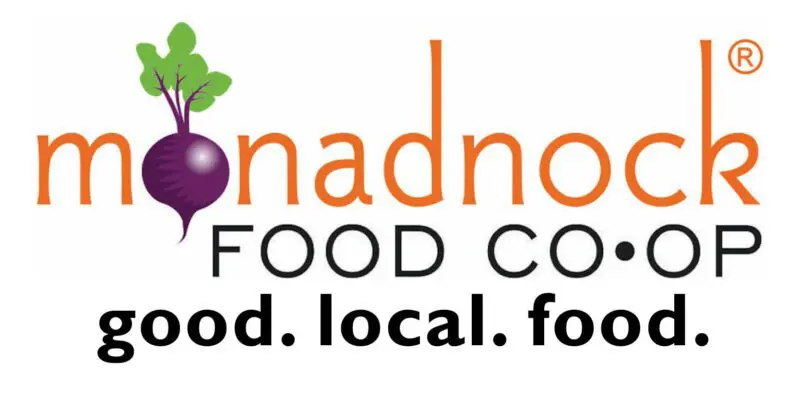Following our 2040 Film Screening, we sent out a short survey to learn more about your vision of the year 2040.
What’s your vision for the year 2040? What do you see in your yard, out in your community, and around the globe if your vision happens?

Watch our panelists’ responses: What’s Your 2040?
Read our panelists’ responses: What’s Your 2040?
Dottie Morris, Chief Officer of Diversity and Multiculturalism at Keene State College and Co-Chair of City of Keene’s Racial Justice Committee
I think that we will be able to see a different world in 2040 than we’re living in 2020. At this point, I see a lot of activism. I love working with young people because clearly, as we saw in the film, we are borrowing from their futures. I think it’s very important that we make more platforms for young people to be heard and to be active participants in coming up with some of the solutions. So, that’s my vision — and the future is bright.
Bonnie Hudspeth, Co-operative Development at Neighboring Food Co-op Association
Our communities will respond with a global surge of mutual aid community-organizing, with people — like you and me — building up our skills together. So that in 2040 our world will be made up of people-centered cooperative organizations and businesses. They’ll work together in areas of common interests like shared community projects — which we can already see happening in the Monadnock Region. That’s already manifested through Monadnock Food Co-op and the connection it has with local farmers and others.
Marty Castriotta, Farmer/Owner of Village Roots Permaculture Farm
I think the vegetable market farmers and the dairy farmers are some of the hardest working people that I know — and their work is tremendously valuable. So, I’ll start by saying that. I think that we need to strive for agricultural systems more perennial in nature. I think we need more agroforestry in 2040 and we need to start this now. I think the Monadnock Region needs more perennial systems of agriculture.
Julie Davenson, Executive Director of Stonewall Farm
In 2040, I am relieved to say that countries across the globe realize the extractive paradigm that drove the endless promotion of growth and economic development was not sustainable. Leaders around the globe recognized this when the world economy came to a grinding halt during the great 2020 pandemic. We realize that if we are to sustain life on the planet we must change — that it was possible to change. It was the voice of the youth and visionaries of all ages that gave rise to this movement. The great pandemic created a fundamental shift in people’s awareness across the globe that our way of life was extremely fragile.
Todd Horner, Planner at Southwest Region Planning Commission
Technologies that exist today are walking and bicycling. And in my vision for 2040, these are a much more common form of transportation. Also, planting more trees especially in more urbanized areas.
Dori Drachman, Board Member for Monadnock Sustainability Hub
By 2040 I think we will have learned some lessons, that we need each other. We need the rest of the natural world and we will need to take care of each other — and by other, I mean both other people and other beings. We will be hopefully kinder to each other.
John Kondos, Founding Board Member for Monadnock Sustainability Hub
I see lots of solar and wind in 2040. I think I see a much more robust local agricultural economy. I think what we have now is really quite exciting. I have to comment on electric vehicles — I’ve had mine for almost two years and I can’t imagine driving a combustion engine vehicle again. I certainly wouldn’t buy one.
Read our community’s responses: What’s Your 2040?
2040 Visions
- Already grow food, organic, permaculture. Want to put up solar and have solar-powered house and car. Bicycle more.
- Solar power being used by the masses, electric cars, single-use plastic prohibited, fewer cars on the roads, cities ban cars on certain days, reduced light pollution, stronger environmental laws, less waste
- Distributed energy and the benefits for local people, farms that feed first and then generate fuel (if that’s even necessary), social justice when everyone gets fed and be can have discussions of collective actions that aren’t labeled as socialist or communist or some other ist.
- Local economies thriving, less pollutants, better recycling options, humans concerned more about the earth than extreme profiteering.
- Keene will have achieved 100% renewables for electricity and would be well on its way for heating and transportation. That means many homes and businesses will have switched to heat pumps and many car owners will be driving EV’s.
- clean air. clean water. people who feel connected worldwide and who care for the planet collaboratively!
- Few people judging other people. I hope to see more American Flags on display in my community.
- clear air, clean water,
- I won’t be around in 2040 but I would like my grandchildren and great-grandchildren to live on a planet that is regenerating.
- I see the same hybrid system of tech and the natural world only held back by capitalism. If we had the policies to create this vision of 2040 it would happen in 2030.
- I have a vision for 2040 in which straight, white men from places like Australia and the US are not the center of vision-making and professing the need to save girls in the ‘third world.’ Unfortunately, I found I was not the right audience for the film’s 2040 vision and I actually have met one of the Australian’s interviewed in the film and have worked with people deeply engaged in environmental politics in Australia. Anyway, I found the film deeply tone-deaf in the age of Black Lives Matter and MeToo, but I’m glad I saw it.
- We saved countless species, minimized climate refugees and winter is shorter but stabilized because we acted in 2020: put a price on greenhouse gasses, ended dirty fuel subsidies and got serious about other solutions.
- In my 2040, we have broken away from our dependency on fossil fuels. The carbon-emitting fires of the industrial, military, prison and institutionalized age have gone cold. We reached a critical mass understanding of how much we had to sacrifice in order to feed a greedy, addictive, exploitative, and endlessly destructive way of life that brought on the sixth major extinction on the planet. Collectively, we slowly began reclaiming the Earth as our Mother and with that, the deepest desire to protect her and all of the life she supports. We learned some harsh lessons about what’s really important in life. We need a living, breathing biosphere, free of toxic chemicals. We need pure water, clean air, and fertile soil teeming with microscopic organisms. All of our foods, medicines and basic needs are sourced locally. Rather than striving for technological advancements, we have become comfortable with our place within the web of life. We consider each other as kindred spirits. We know how to resolve conflicts respectfully. We live independently or communally and have perfected the art of sharing, caring, cooperating, and appreciating the gift of life. We look for guidance from children and nature-inspired leadership. We honor and celebrate the full circle of life with limitless expressions of creativity.
- I hope to see a full turnover to solar and wind-generated energy and a LOT more greenspaces. Roof gardens in urban areas to provide local fresh produce as well as recreational spaces.
- An economy centered on local food production, spiritual growth instead of consumerism, much housing and farmland community-owned, removed from the “free” market.
- Ecotourism in this area. Bike trails suitable for commuting and vacations
- Even though I’ll be 90 (if I’m still around), I hope that I’ll still live in my house and will have time to resurrect my vegetable garden since I’m not spending time fighting pipelines and fossil fuel expansion.
- Neighborhood connections, involvement with town/city community aspects. People-controlled food system through co-operatives, housing/energy/education connected virtually but people-centered locally.
- My vision for 2040 is that Keene and the Monadnock Region are a healthy, safe, and family-friendly place to live with lots of opportunities for social connection through community events, outdoor concerts, festivals, etc. There are lots of farm-to-table businesses with diverse restaurants featuring a diversity of cuisines from around the world. Our population is much more diverse, too. I can get around easily by foot, by bicycle, by bus/transit or by car (EV). Everyone has access to high-quality health care and educational opportunities that are either free or affordable, and the citizenry are actively involved and engaged in local government and decisions that shape our community.
- Get rid of single-use food containers and excess plastics leading to less trash, landfills, polluted waters etc.
- sustainable energy everywhere, soil regeneration and gardens for everyone.
- I see our cohousing community landscaped with edible perennials and the fields full of flourishing CSA vegetables. I see us off the grid with solar panels and electric car plug ins. I see electric public transportation connecting Peterborough with Brattleboro, Boston and Burlington. I see bike lanes where parking spaces were along downtown Main Street.
- Shared utilities and sustainable agriculture
- My yard will have more fruit- and nut-bearing trees and shrubs. More permaculture in general, raise more food. Have a battery back up for our solar panels and heat pumps for heating/cooling and hot water. The community (my town and neighboring ones) will have a much greater awareness and practice of living in harmony with nature. We’ll have truly affordable housing to meet passive house standards (or whatever the most energy-efficient thing is by then). We’ll keep our rural and agricultural areas intact with building focused in village centers which have become walkable communities. The world will have much greater equality with all beings respected. Wildlife will flourish as will rainforests, savannas, mangroves, and other habitats. The oceans will be clean and we will not use plastic except in special applications (e.g. medical). All will have ample, nutritious food. Love will prevail
- Food growing
- I imagine 2040 to be increasingly automated with more advanced technology. The weather may be more volatile resulting from the overuse of energy such as fossil fuel. The gap between developing and developed countries will continue to grow.
We also asked folks which topics they were most passionate about:

Other topics shared:
- Forest conservation
- all of the above
- Evolving to a better potential
- Putting a price on greenhouse gasses
- Nature-based leadership and education
- Total elimination of single-use plastics
- Promoting a holistic world view that incorporates recent science, and indigenous perspectives
- Energy Efficiency and weatherization
- Non-institutional education
- Farmers Markets, Organic Foods
- Save forest and wetlands
Here’s a quote that one event attendee shared:
Both this movie and discussion group experience were both so heartening. Our 6 year old watched a good portion of the movie with me and asked, “Is this the future?” and I said, “It’s what the future could be!” and he said, “Okay. I’d like that.” HOPE!
Here are some ways to stay connected and inspired:
- Check out this list of local and state organizations working on regenerative ag, social justice, cooperatives, renewable energy and transportation
- Sign up for e-newsletters from the Monadnock Food Co-op and MONIFF
Again, a big thank you to everyone who helped make this event possible.
First, thank you for watching. And thanks to all of our panelists and moderators.
We want to thank our wonderful partner organizations for helping us spread the word about this event.
Finally, while we’re sad that we’re still not able to come together to enjoy films in-person at our favorite local cinemas and theaters, we’re grateful for opportunities like this to stay connected, albeit virtually.

